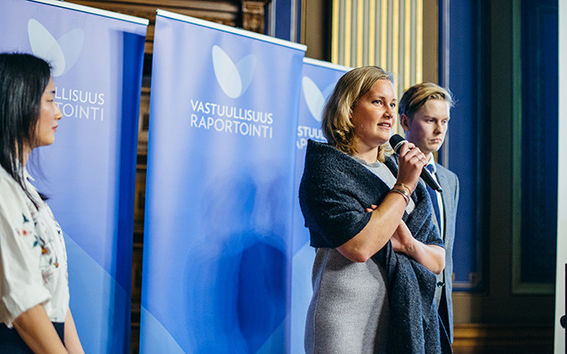Good corporate responsibility reporting practices are an integral element of a successful organisation's activities

Corporate responsibility means that companies are obligated to operate responsibly within their society as well as elsewhere. The business activities of a responsible company are guided by laws, decrees, international agreements and recommendations, framework agreements between trade unions and companies as well as the company's own directives. In practice, companies generally aim to exceed the minimum requirement level set in these kinds of guiding documents.
'The quality of Finnish corporate responsibility reporting has improved due to the efforts made to better them. The FIBS Corporate Responsibility Network and Suomen Tilintarkastajat have cooperated successfully in this venture. Additionally, School of Business Professor Raimo Lovio and his team have participated in the development of the national Reporting Competition. Members of the group have regularly given guest lectures at universities and companies on the communication and reporting of corporate responsibility. Naturally, companies also need professionals interested in the subject, who will carry out responsibility work and reporting in practice to ensure that these matters progress, says researcher Mika Kuisma, DSc (Econ.), a member of the School of Business research group on sustainable business.
Corporate responsibility reporting is becoming mandatory for larger companies in the EU, and integrated reporting is set to become a new feature. We have also transitioned to version 4 of the Global Reporting Initiative (GRI), the most significant corporate responsibility guidelines
'The newest GRI guidelines place an even greater emphasis on reporting of matters that are of key importance to the companies and their stakeholders and the description of corporate responsibility management. This aims to ensure that company stakeholders, i.a. investors, get even better service. Integrated reporting also aims to e.g. ensure that investors are provided more detailed information on the future of a company, while it also facilitates a lighter workload related to reporting ,' Mika Kuisma explains the breakthrough.
Stora Enso's report was also the students’ choice as the year's best corporate responsibility report
'The corporate responsibility reporting competition was first organised in 1995 making this year's competition the 21st of its kind. Researchers from the School of Business have been involved in the competition in various ways from its start. This year, Mika Kuisma is once again representing the School of Business as a member of the organising group and a member of the jury. Previously, Mr Kuisma has also actively taken part in the evaluation of reports.
The aim of the competition is to examine the current status of responsibility reporting and its developing development as well as to encourage all companies and organisations to carry out responsibility reporting. The competition specifically evaluates each company’s corporate responsibility reporting and does not assess the responsibility of business activities in other respects.
Stora Enso's corporate responsibility report won the first prize and was also the media's and students' choice for best report of the year. Stora Enso Sustainability Report 2015 was the only report to place in the top five in every competition category, and for this reason was the clear winner of the entire competition. This year, there were a total of five competition categories: biodiversity, climate change, human rights, payment of taxes and corporate responsibility as the basis of rewarding management.
Students Hanna Kim, Eerik Klemetti and Melina Pinomaa from the School of Business presented the students' choice, which was Stora Enso as well. The student jury comprised a total of 22 students from six universities and universities of applied sciences.
'The report detailed the objectives set by the company, the development of the company's activities as well as failures in its activities as a result of which the report was informative, transparent and balanced,' the students concluded.
The reports of 146 companies and organisations were evaluated during the 2016 Responsibility Reporting Competition. These reports covered 2015 or had been published in the time period between 1 August 2015 and 31 July 2016.
Further information on the competition and criteria for granting awards:
FIBS Corporate Responsibility Network website
Further information:
Mika Kuisma, DSc (Econ.)
Aalto University School of Business
Department of Management Studies
Sustainable business research group
mika.kuisma@aalto.fi
Read more news
Eden Telila's master's thesis contributed to Ramboll's geotechnical toolkit
Geoengineering alum Eden Telila helped Ramboll automate manual tasks.
Join a Unite! matchmaking event on forging new consortia for Horizon Europe applications
Calling researchers and industry partners to connect at a virtual matchmaking session designed to spark project collaborations for Horizon Europe funding. Registration deadline, 12 March.
Join the Unite! Virtual Education Summit- Registration now open
Join us in shaping international collaboration! This online event takes place 12 March, 2026.






